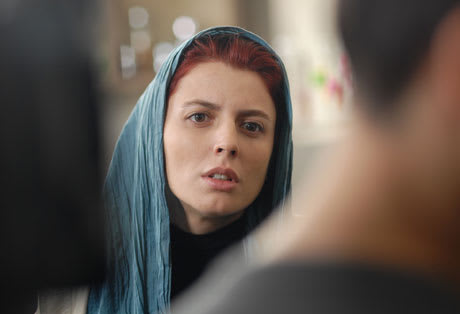As Iranian director Asghar Farhadi notes during the subtitled commentary track included with this DVD, our perspective of the audience is that of judge throughout the Best Foreign Film Academy Award winner, A Separation. During the opening scene, Simin (Leila Hatima) and Nader (Peyman Moadi) sit in front of a judge requesting a divorce. Simin is in the middle of a time crunch, having just over a month to move her daughter, Termeh (Sarina Farhadi), to the U.S., presumably for a better life, while Nader wants to stay in Iran and take care of his Alzheimer's-afflicted father. Granted the divorce, but not custody, Simin leaves the household unit, and Nader hires the highly religious and pregnant Razieh (Sareh Bayat), resulting in a moral dilemma on her end, given her refusal to tell indebted husband Hojjat (Shahab Hosseini) that she's working. This set up is just the tip of the iceberg of compounding complications and intricate human drama. Each character is put in a situation where telling the truth conflicts with their wellbeing and self-preservation. Whether the implication is that all problems in Iran stem from Liberal allowances for things like divorce and employing women, there is a distinct duality between class systems and ideologies, with the poor judging the rich for a lax perspective on religious doctrine and vice versa. Amidst the exceedingly realist and impeccable performed squabbles between the many varying characters is a constant thematic trajectory of reluctant moral flexibility. As Razieh confronts religious beliefs by changing and cleaning a nude elderly man, Nader struggles to practice what he preaches while lying about a domestic dispute in front of his daughter's quietly judging eyes. Inherently, there are some traditionalist threads throughout A Separation that make it occasionally hard to digest, but the depiction of conflict and personal sanctimony is impressively rendered and easily transposed to universal truths outside of Iran. This is easily one of the most compelling human dramas of 2011. Included with the DVD are a variety of interviews with director Asghar Farhadi, who tends to preface discussions by saying he wants to leave interpretation to the viewer, only to analyze everything shortly thereafter, to a very focused and specified degree. It seems his characters aren't the only hypocritical figures depicted on this DVD.
(Sony)A Separation
Asghar Farhadi

BY Robert BellPublished Aug 17, 2012



